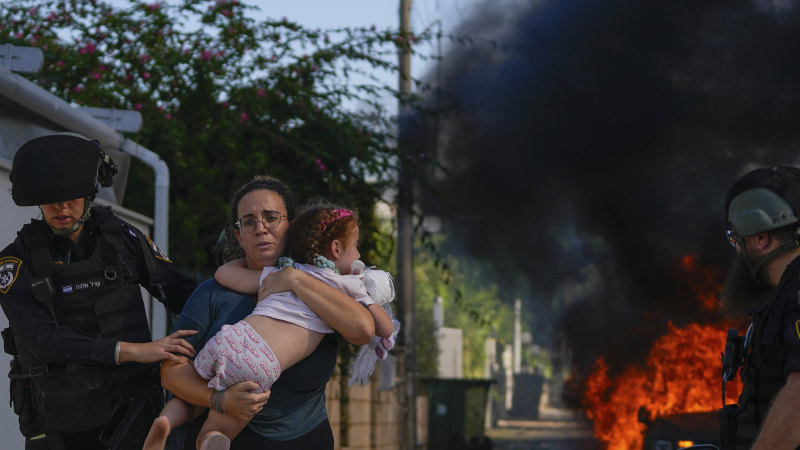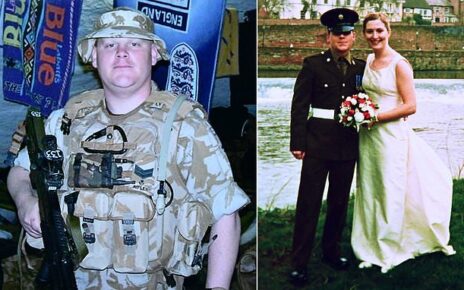Save articles for later
Add articles to your saved list and come back to them any time.
Chilling videos of Israeli hostages being bundled into Gaza at the weekend have become defining images of the escalation in the Israeli-Palestinian conflict.
Footage of terrified children, women, the elderly and festival-goers – some bloodied and others hooded with their hands tied behind their backs – taken hostage by Hamas militants has flooded social media.
A captured Israeli civilian from Kibbutz Kfar Azza, wrapped in white, being taken into the Gaza Strip.Credit: AP
Some have watched the abduction of loved ones in online clips, including the father of Israeli woman Noa Argamani, who was kidnapped while trying to flee a music festival in southern Israel, near Gaza.
Yakov Argamani was overcome with emotion as he relived the moment he watched a video of a group of men driving away on a motorcycle with his 25-year-old daughter.
Noa screams with her arms outstretched to her partner, Avinatan Or, who has his arm pinned behind his back as he is marched away.
“One couldn’t describe it with words,” Argamani told reporters in Israel. “She is my only daughter.”
A Palestinian child walks with a bicycle by the rubble of a building after it was hit by an Israeli airstrike, in Gaza City on SundayCredit: AP
At least 700 people have been killed in Israel and more than 400 have been killed in Gaza since Hamas launched a surprise, large-scale attack on Israel on Saturday.
The number of hostages taken by Hamas remains unknown, but early estimates suggest there could be more than 100.
Israel Defence Forces spokesman Lieutenant Colonel Jonathan Conricus said the hostage situation was the most dominant factor that would shape Israel’s military response in the coming days.
Greg Barton, a professor of global Islamic politics at Deakin University’s Institute for Citizenship and Globalisation, said militant groups, including Hamas, had a long history of taking hostages in the region. But he said the number of hostages captured so far marked the “biggest such crisis of its kind in modern Israeli history”.
“We can make some reasonable speculations about what their intent is and motive is for taking hostages,” Barton said.
“They [Hamas] want human shields. They have their own fellow Gazans and other Palestinians in the Gaza Strip as human shields, but they know when push comes to shove, the IDF [Israel Defence Forces] will try and avoid civilian casualties, but it won’t absolutely refuse to act on the basis of civilian casualties.”
So far, no Australia citizens have been reported dead or captured. The US and UK are investigating reports Americans and a British citizen were among those killed or taken hostage.
A White House National Security Council spokesperson confirmed on Monday several Americans had been killed.
Barton said that, in the past, Israeli hostages had been held in “reasonable conditions” for many years because of their value in exchanges.
“Israel has a history of ‘leave no man behind’. It is a strong part of Israeli ethos, whether it’s on the left or right of politics,” Barton said.
He said deals had also been struck for human remains to be returned to Israel.
In 2011, Israel swapped hundreds of Palestinian prisoners for the release of an Israeli soldier who had been held captive for five years. The exchange sparked criticism at the time for being lopsided.
Experts say a similar exchange would be almost impossible now because of the escalating violence and number of hostages Hamas has taken.
Australian National University professor Clive Williams, an expert in counterterrorism, intelligence and national security, said Hamas had appeared to disperse the Israeli hostages within Gaza, which will make Israeli recovery by force extremely difficult.
“Hamas will inevitably be defeated militarily, but having Israeli hostages will give Hamas leverage over Israel to release Palestinian detainees and perhaps force Israel to resume talks to achieve a negotiated political settlement,” Williams said.
Hamas’ headquarters, weapons and training facilities are scattered across the Gaza Strip. Already, Israeli airstrikes have destroyed Hamas offices and training camps.
Barton said Israel would have intelligence on the whereabouts of the group’s leaders and their families.
“They will strike those places, but what they don’t know, of course, is who else will be there, including Israeli hostages, so that’s the powerful logic for taking hostages,” Barton said. “What this does is buys Hamas more time by slowing down what the IDF is prepared to do.”
The images of one Israeli family purportedly taken hostage have been shared on Instagram by British comedian Sacha Baron Cohen, who appealed for help finding them.
The Borat star shared a photo of the mother, Doron, and her daughters, Raz and Aviv, and said they had been filmed being captured by Hamas. “May the whole world see these faces and bring them home to us,” he wrote.
Barton said questions were rightly being asked about what could have been done to avoid this attack.
“The challenge in the short to medium term is what can be done to minimise the loss of lives on all sides,” he said.
“But in the longer term, what we are reminded of again is that while there is no excuse for what Hamas has done, there is no lasting peace without a political solution that is just and robust.”
He said global leaders, including Prime Minister Anthony Albanese and US President Joe Biden, would be quietly questioning the Israeli government’s “reckless, tough-minded approach to governance and ongoing disregard for the lives of Palestinians” in the lead-up to the crisis, despite their vocal support for Israel.
“I think privately there will be a lot of taking stock about what could have been done politically to avoid this and what must be done politically in the future,” he said.
Most Viewed in National
From our partners
Source: Read Full Article




